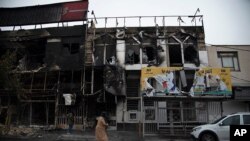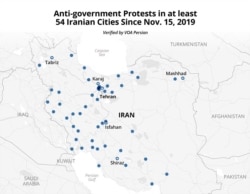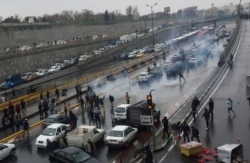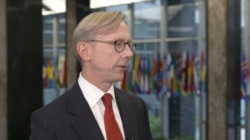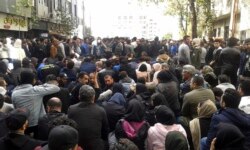Iranian President Hassan Rouhani has claimed victory over the country's "enemies" that he has blamed for the deadly nationwide anti-government protests against a unpopular gas price hike.
In remarks aired on state-owned television Wednesday, Rouhani said "spontaneous" pro-government demonstrations across Iran earlier in the day showed the true power of the Iranian people against a "conspiracy" carried out by Saudi Arabia, Israel and the United States.
Iranian state TV broadcast images of pro-government rallies in several locations on Tuesday, in an effort to minimize the protests. Authorities also extended an almost complete shutdown of internet access into a fourth day to stop Iranians from sharing images of the protests with the outside world. The outage, which began late Saturday, made it difficult to determine the extent of Tuesday's protests.
The demonstrations erupted in response to the government abruptly raising the subsidized price of gas by 50% early Friday. Many Iranians see the increase as putting a further burden on their wallets at a time of worsening economic conditions.
Amnesty International says Iranian security forces have killed at least 106 people in nationwide anti-government protests since Friday, four times the death toll of Iran’s last mass protests two years ago.
In a Tuesday interview with VOA Persian, the London-based rights group’s Iran researcher, Raha Bahreini, said Amnesty determined that security forces killed 106 protesters based on eyewitness accounts, social media videos and reports of exiled Iranian human rights activists.
An Amnesty press release said it recorded fatalities of protesters in 21 towns and cities, with the highest numbers of deaths occurring in five western cities: Kermanshah, Javanroud, Bandar-e Mahshahr and its suburbs, Mariwan and Behbahan.
VOA Persian has independently confirmed the killings of at least seven protesters in shootings by Iranian security forces on Saturday.
Iranian state media have said several people were killed, including at least one security force member in the demonstrations that began Friday and spread to dozens of cities. But the Iranian government has not released any official numbers on deaths and injuries or arrests of protesters.
Bahreini said Amnesty has called on the United Nations and European Union to make urgent appeals to Iran to end its violent crackdown on the protests and to respect Iranians’ rights to freedoms of expression and assembly.
Iran violently suppressed the last major wave of nationwide protests that swept the country from late December 2017 to early January 2018. At least 22 people were killed in the crackdown on those protests, which were fueled by public anger with government corruption and mismanagement.
Speaking to VOA’s Persian Service late Monday, U.S. Special Representative for Iran Brian Hook accused Iran’s Supreme Leader Ayatollah Ali Khamenei of using his most powerful military branch, the Islamic Revolutionary Guard Corps, to “murder innocent Iranians” while suppressing the latest protests.
“We have called on the regime to stop using force against its own people. We hope that more countries around the world demand the same thing,” Hook said in an interview at the State Department.
U.N. human rights agency (OHCHR) spokesman Rupert Colville told reporters in Geneva that his office is “especially alarmed that the use of live ammunition has allegedly caused a significant number of deaths across (Iran).”
Colville urged Iran to honor its commitments to respect the rights to freedoms of expression and peaceful assembly as a signatory to the International Covenant on Civil and Political Rights.
“We also call on the government to immediately reestablish Iranians' access to the internet, as well as other forms of communication which allow for freedom of expression and access to information,” he added.
Hook told VOA Persian that the Trump administration is “doing what we can” to enable the Iranian people to circumvent their government’s internet shutdown. He did not provide examples of U.S. government action, but he did appeal for one specific action to be taken by social media companies.
“We think that it is appropriate for any social media company to suspend the social media accounts of Khamenei, (Iranian President Hassan) Rouhani and (Foreign Minister Mohammad Javad) Zarif until they turn the internet back on,” Hook said. “This really speaks to the hypocrisy of the regime. They shut down the internet so the people can't use social media, and then the supreme leader and the president and the foreign minister use social media in order to tell their side of the story.”
By late Tuesday, Rouhani had not posted on his verified Farsi or English Twitter accounts since Nov. 15, while Zarif’s verified Twitter account had been inactive since Nov. 12.
But Khamenei’s unverified English Twitter account posted its first message since the protests began, with a late Tuesday tweet highlighting a comment he made to supporters earlier in the day.
In the quote, Khamenei appeared to refer to the protests of recent days and his crackdown on them as “security issues” involving the “enemy.” Khamenei has frequently blamed domestic unrest on foreign enemies such as the U.S. and its allies.
There was no immediate comment from U.S. social media giants Twitter or Facebook on Hook’s appeal for them to close the accounts of the three top Iranian officials. In the past, the companies have declined to respond to questions about the status of Iranian leaders’ accounts.
This article originated in VOA’s Persian Service.




